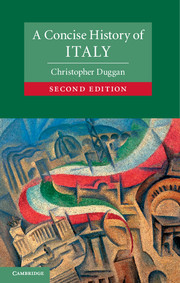Book contents
- Frontmatter
- Contents
- List of Illustrations
- List of Maps
- List of Tables
- Preface
- Chronology
- Introduction
- 1 The geographical determinants of disunity
- 2 Disunity and conflict: from the Romans to the Renaissance, 400–1494
- 3 Stagnation and reform, 1494–1789
- 4 The emergence of the national question, 1789–1849
- 5 Italy united
- 6 The liberal state and the social question, 1870–1900
- 7 Giolitti, the First World War, and the rise of Fascism
- 8 Fascism
- 9 The Republic
- Bibliographical essay
- Index
5 - Italy united
Published online by Cambridge University Press: 05 June 2014
- Frontmatter
- Contents
- List of Illustrations
- List of Maps
- List of Tables
- Preface
- Chronology
- Introduction
- 1 The geographical determinants of disunity
- 2 Disunity and conflict: from the Romans to the Renaissance, 400–1494
- 3 Stagnation and reform, 1494–1789
- 4 The emergence of the national question, 1789–1849
- 5 Italy united
- 6 The liberal state and the social question, 1870–1900
- 7 Giolitti, the First World War, and the rise of Fascism
- 8 Fascism
- 9 The Republic
- Bibliographical essay
- Index
Summary
The year of revolutions in Europe of 1848–9 was more an outcry at the shortcomings of the restoration states than a conscious struggle for a new social order. Many of the intellectual leaders or interpreters of this ‘springtime of the peoples’, from Karl Marx to Mazzini, hoped and indeed believed that a world free of oppressors and tyrants was about to be born; but the artisans, shopkeepers, and urban poor who made up the backbone of the insurrections, and took to the streets of Palermo, Berlin, and Vienna, threw up barricades and stormed town halls, acted more from a spontaneous anger at unemployment, prices, or taxes than a desire to create a wholly different society. Nevertheless, in at least one important respect 1848–9 did look to the future: it sounded the death-knell of absolutism. The idea that a government should prevent change and freeze society in the interests of a narrow elite, seemed untenable in a world that was already beginning to be transformed by industry and science.
The quickening pace of Europe’s economic life from the 1830s was to quicken even more after the 1840s. Britain led the way: in the mid-1840s it had some 3,000 miles of railways; by 1850 this figure had more than doubled; and by 1860 the total stood at over 10,000 miles. Output of cotton and pig-iron, the cornerstones of industry in this period, soared; so too did production of an enormous variety of other often newly invented goods, as world demand, depressed for more than thirty years, picked up dramatically. Faith in the march of progress seemed boundless, and was enshrined in the Great Exhibition, opened in 1851. In France, Belgium, and the German states the rhythm of economic life was similarly, if rather less dramatically, transformed. Small workshops became great factories; towns became sprawling cities; peasants became proletarians; and everywhere, the middle classes grew more numerous and assertive.
- Type
- Chapter
- Information
- A Concise History of Italy , pp. 118 - 143Publisher: Cambridge University PressPrint publication year: 2013



